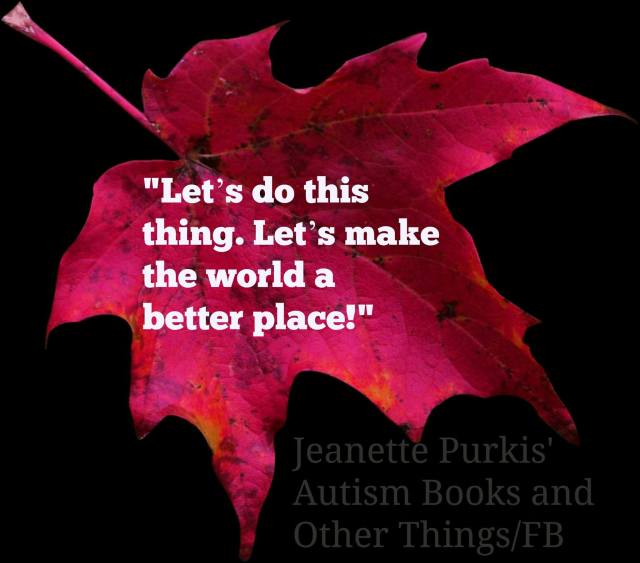I was asked to speak at an autism event last year. The organisation hosting it told me they have one presentation on autism each year and it was a great privilege to be asked to speak there. I prepared my talk and travelled to the town the talk was in. The neurotypical organiser asked me something I have never been asked before and hope never to be again. They said ‘so what are you going to wear tomorrow Jeanette?’ I was very tempted to say I would be naked due to my respect and love for nature but restrained myself. At the talk the same person asked my how to ‘manage militant politically correct autism activists?’ I suggested that listening to them was probably the best idea given the way things are now and that those who attack ‘political correctness’ are more of a worry as they are essentially fighting for the right to be disrespectful. I did not hear from the organisation who asked me to speak again.
This illustrates something I have noticed over my advocacy career: the idea of the ‘tame’ autistic advocate cast against the role of ‘militant activist.’ While I deliver my message in quite a gentle way, I never want to be ‘tame’ and part of some divisive attempt to separate autistic people and alienate us from one another.
If an organisation wants an autistic speaker they should be prepared to be challenged and learn from that person and their peers. My concern when I am seen as the ‘tame autistic’ is that the organisation maybe wants to just tick the ‘we got an autistic person at our event’ box. If that is the case it makes me concerned that the organisation is not looking to learn anything at all so there is probably not much point me being there.
The context to this is simple as far as I see it. Autistics are a stigmatised, oppressed, bullied and unappreciated minority. We have been this for ages but we didn’t have much of a voice until recently. Many of us experience post-traumatic stress from a variety of traumatic events and triggers, including for some from ABA – supposedly a ‘therapy’ for autism! We spent our lives being discriminated against, hated and disrespected but now we have a community and our voice – lots of voices actually! We want our message to make a difference. We want a world where the kind of misery we have experienced doesn’t continue to happen to us or our children and the next generation.
People booking autistics to write and speak need to know this. Yes, I am a gentle person and I try to include everyone when I speak and for it to be meaningful for allistics and autistics alike, but those oppressions and aggressions in the previous paragraph? Yes, I experienced and continue to experience those too. I am not a ‘tame autistic’ and never intend to be one. Those that want such a speaker or writer have missed the point as far as I am concerned. Change is clearly and definitively not about ticking boxes. It is about listening to our perspectives and learning from us, whatever we may be wearing! The organisations who complain at speakers for being to ‘bolshie’ are the ones who need our thoughts and words and messages the most.
Mostly I speak for the audience rather than for the organisation booking me so I have endured some unhelpful things from organisations but I am very tempted to put together a checklist of ‘why are you booking an autistic speaker’ and also ‘what will you do to ensure they are included, respected and supported along with autistic attendees at the event?’ If an organisation is seeking autistic input it really should be genuine.
Imagine booking an engineering conference but asking everyone involved in building bridges to speak and not engineers. Sure, you will get some idea of what a bridge is and how to use it but not the key message. We are experts in our lives. This doesn’t mean every autistics speaker can present on any topic related to autism because we cant;. What it does mean is that we are likely to share a number of attributes and experiences with other autistics which allistics / neurotypicals do not. We will notice things others are completely unaware of.
The really good thing in all of this is that being respectful and inclusive is helpful for everyone: An organisation supporting autistic kids is almost certainly going to see a difference in their work when putting into place the ideas from actually autistic people. If you are working with autistics then it is essential to gain the views of autistics who have used similar services to the one you are offering. It just seems so obvious to me. And if the people you seek advice from challenge or disagree with you? Well take the opportunity to learn from that. This is good, useful feedback which will improve the service you are offering.
There is a ways to go with this but we do seem in a better position to support organisations to move beyond wanting a ‘tame autistic’ to tick the box and instead valuing the vital contribution that autistic people have.

Reblogged this on Just Under Your Radar and commented:
Great post from Jeanette Purkis. It’s always a balancing act, of course, but having non-autistic people dictating the terms of our behavior and speech to us…? No thank you. Especially when it’s at the expense of truth and teachable moments.
LikeLiked by 2 people
Reblogged this on QuirkyBirdWords.
LikeLike
Reblogged this on dyslexic annie's Blog.
LikeLike
Reblogged this on Art by Nicole Corrado.
LikeLike
This, so just this. Thank you.
LikeLiked by 1 person
Reblogged this on Autism Candles.
LikeLiked by 1 person